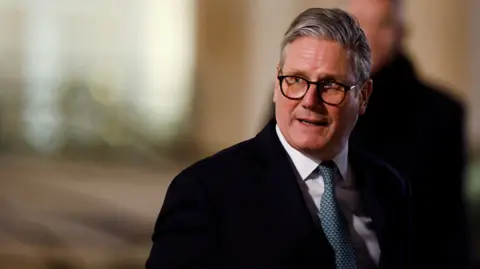Sir Keir Starmer, the UK Prime Minister, has voiced that any peace agreement for Ukraine must have a “US backstop” to prevent future Russian aggression. In his comments after an urgent meeting with European leaders in Paris, Starmer emphasized that this backstop is essential for ensuring Ukraine’s security in the long term. He stated that only a “US security guarantee” could effectively deter Russia from any future attacks on its neighbor.
During the meeting, which took place at the Élysée Palace, Starmer discussed his position on potential UK troop deployment to Ukraine in the event of a durable peace agreement. He has shown openness to the idea of sending troops, although it remains a matter of political discussion. “The US backstop would provide the security necessary to deter Russian aggression,” said Starmer. He also stressed the importance of Europe’s role in defending its own territory, citing Russia’s actions as a major security threat that required a unified European response.
Germany’s Chancellor Olaf Scholz, who participated in the meeting, expressed his reservations about the suggestion of sending troops to Ukraine at this stage, calling the discussion on such matters “completely premature” and showing irritation at the timing of the conversation.
Starmer’s comments reflect a broader debate about the military responsibilities of NATO members and Europe’s increasing responsibility in defending its own security. While some European leaders have been critical of the US’s decision to initiate peace talks with Russia without consulting Ukraine first, others, including French President Emmanuel Macron, have signaled that consultations with Ukraine will be a key part of future discussions.
Ukrainian President Volodymyr Zelensky, whose government was not informed about the peace talks in Saudi Arabia, stated firmly that any agreement made without Ukraine’s direct involvement would not be recognized. This has led to a delicate diplomatic situation as European leaders, including Macron, strive to balance their support for Ukraine with the demands of their US counterparts.
On the question of the US’s role, US Defense Secretary Pete Hegseth stated that Europe must take on more responsibility for its own security moving forward, a sentiment echoed by Polish Prime Minister Donald Tusk, who highlighted the new phase in transatlantic relations. Sir Keir Starmer agreed, asserting that NATO would continue to play a critical role in security, but added that Europe must now “step up” its defense capabilities.
Starmer and his European counterparts recognize that a long-term peace deal will require much more than diplomatic negotiations. They warned that any force stationed in Ukraine post-conflict must be substantial, well-trained, and ready to deter Russian aggression. Experts suggest that this could involve thousands of troops, air support, and logistical capabilities—a massive commitment that would necessitate significant increases in defense spending across Europe.
In discussions with the press, Malcolm Chalmers, Deputy Director of the Royal United Services Institute, stated that if the UK and its allies were to send a peacekeeping force, it would need to be robust enough to act as a deterrent, not just an observer force. Former NATO commander General Sir Adrian Bradshaw agreed, stressing that such a force would need to be large and well-equipped enough to handle potential future conflicts beyond Ukraine’s borders.
The UK currently contributes about 2.3% of its GDP to defense spending, with plans to increase this to 2.5%. Sir Keir Starmer confirmed that defense spending is a priority, and the UK government will soon outline its plans to meet the 2.5% target. European leaders, such as Danish Prime Minister Mette Frederiksen and European Commission President Ursula von der Leyen, have similarly called for a “surge” in defense spending to address the growing threats from Russia.
The discussions in Paris also focused on the importance of maintaining unity among European nations while also seeking greater autonomy from the US in securing the continent’s defense. In a rapidly changing geopolitical landscape, European leaders are seeking a more assertive stance, with Starmer making it clear that Europe must take more responsibility.
At the same time, diplomatic tensions remain, with some leaders expressing concern over possible concessions to Russia, especially regarding Ukraine’s territorial integrity. The need for a lasting peace deal was stressed by Sir Adrian, who warned that if Ukraine cannot return to its pre-war borders, efforts should focus on establishing a peace that can prevent further escalation.
As the peace talks progress, the role of the UK, the US, and other NATO members remains a key factor. Sir Keir Starmer’s meeting in Washington next week with US President Donald Trump will likely be a critical moment in shaping Europe’s response to the conflict and its future defense commitments.
The UK government has also acknowledged that the deployment of troops would require parliamentary approval, with some support for the move coming from political parties, including the Liberal Democrats. The discussions are ongoing, and the UK’s role in any future peacekeeping mission remains a point of contention in the broader diplomatic and military debates surrounding the war in Ukraine.
Meanwhile, the situation on the ground in Ukraine continues to evolve, with Russia’s ongoing strikes on civilian areas and energy infrastructure. Over the weekend, Russian airstrikes resulted in civilian casualties, and parts of Ukraine experienced emergency blackouts. As the war drags on, international focus remains on achieving a peace agreement that can guarantee security for Ukraine and stability in the broader region.
Stay ahead with the latest news on global innovation, leadership, entrepreneurship, business, and tech. Join us on WhatsApp or Telegram for real-time updates. Have a report or article? Send it to report@theinnovationtimes.com.
Follow us on X (Twitter), Instagram, LinkedIn, YouTube, Pinterest and Facebook for more insights and trends



